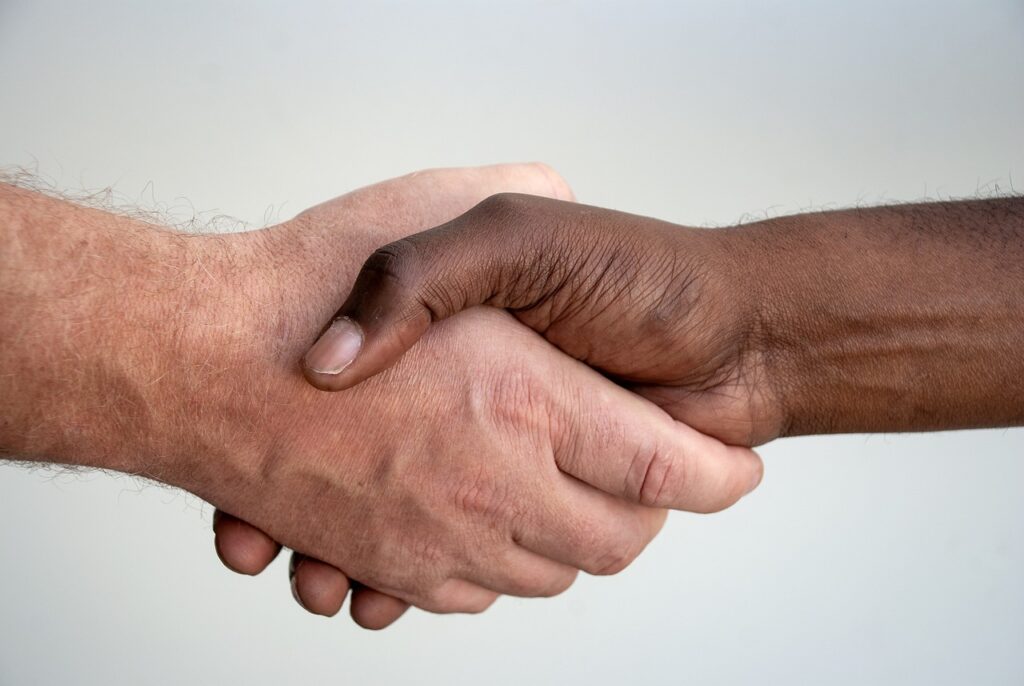Living in a foreign country gives you the chance to really get to know and understand a different culture and how its people think. Since I moved to France, I feel like I could write a book about the French way of doing things, because things certainly are done differently here. Not better or worse, just different. One of my favourite examples of this is the many forms of French greetings, because while it sounds simple, it’s decidedly not.
Always Go For the Kiss
For most of my life, my standard form of greeting was to shake a person’s hand upon introduction. At the end of our encounter, I would either shake hands again, or go in for my personal favourite send off: a hug. For the record, I love hugs, and I will happily give one out to anyone who wants one, but sadly I’ve had to curb this habit since I moved to France. In Paris, the standard greeting is what is called a bisous, or the two cheek kiss, and everyone does it. Women to women, women to men, men to men, it doesn’t matter. Just give two air kisses to the cheek, one on each side, for both hello and goodbye. You even give the bisous to people you’ve just met. If you forget and go in for a hug, it really weirds Parisians out. And don’t even get me started on the number of times I’ve punched someone in the stomach just because I’ve stuck out my hand and they’ve gone in for the kiss. Just remember, when in France, always go for the kiss.
Watch Your Grammar
Next up is a very important grammar rule in a language full of grammar rules and gendered spellings. While I am enjoying my time learning the French language, it is exceedingly annoying that it contains the ability to grossly insult someone without ever resorting to profanity. I’m talking of course about the dreaded “tu” vs. “vous” dilemma that is in of itself a minefield of potential social blunders. Both tu and vous mean “you”, with tu referring to the singular form of the word and vous referring to the plural. What I didn’t know upon my arrival, is that vous is also used as a formal expression of you, and it’s used as a sign of respect towards people both in the singular and the plural. Unfortunately, I’ve learned the hard way on one too many occasion that the French do not take too kindly to being addressed improperly. Despite the leeway I’m often given as a foreigner still learning the language, I’ve still managed to ruffle quite a few feathers by using tu too early. Take my advice: when speaking French, always err on the side of formality. The French will tell you when it’s okay to start using tu, and you’ll impress them with your language skills in the process.
Always Start with Hello
I come from a culture where it’s normal to avoid eye contact with a salesperson upon entering a store. It’s not particularly polite, but it’s also often the lesser of two evils when trying to avoid someone working for a commission. That being said, this is a cultural norm that should be left at home, because not formally greeting someone upon entering a store in France is a serious social faux pas. If you don’t, you’ve actually been rude to the salesperson first, and you can expect to get quite a chilly reception. Start every interaction with “Bonjour” and end every interaction with “Au Revoir”, and even if that’s the only French you know you’ll get a lot further than you would without these two magical words.
Greetings Can Stop at Hello
The above being said, be sure to stop at “Bonjour” when it comes to greeting strangers. Don’t add on the customary “How are you?” that we’re so used to in North America. In France, you only ask someone how they’re doing if you really want to know the answer, and therefore this question is reserved for friends and family only. A simple “Bonjour” will suffice for everyone else. If you start asking people how they’re doing on your first interaction, be prepared to receive some weird looks. However, the flip side of this is that I now feel a not insignificant amount of glee when I’ve greeted someone enough times that they decide to tack on a “Ça va?” afterwards. If you get to this point, you’ve officially made a friend.
Bonus
“Ça va” not only means “How are you?” but also “I’m good”, which means that the following is an actual possibility for a legit French conversation.
“Ça va?”
“Ça va. Ça va?”
“Ça va”
Life is grand.
Until next time, enjoy the many bisous coming your way.




